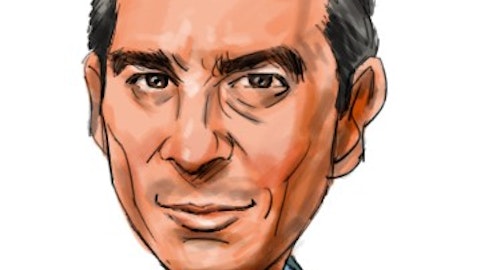
During his presentation, Einhorn noted that the added complexity of the company has discouraged investors, but with some effort, the HMOs can be pulled apart and analyzed. Healthcare is a rapidly growing part of the economy, with current HMOs having scale and protection from regulatory hurdles. Part of what makes HMOs tough to analyze is the fact that they re-price every year, but while they may have a bad quarter or year, the business model makes money over the long term.
Cigna’s key acquisition of HealthSpring should help with the company’s growth prospects. HealthSpring allows the company to expand into the Medicare market, as well as increasing commercial members. Full integration of the HealthSpring acquisition should allow Cigna to increase its 2013 EPS to $5.85, up from the estimated 2012 EPS of $5.35. HealthSpring will continue to be a key part of Cigna going forward, namely because millions of Americans are aging into Medicare eligibility each year. HealthSpring allowed Cigna to expand Medicare coverage in eleven states.
Cigna Corp does have tough competition flooding the Medicare-Medicaid industry, with the likes of Aetna Inc. (NYSE:AET) purchasing Coventry Health Care, Inc. (NYSE:CVH). In light of that, Cigna Corp has outperformed year to date, while other key health maintenance organizations have been beaten down. Top Cigna competitors Humana Inc. (NYSE:HUM), WellPoint, Inc. (NYSE:WLP) and Aetna are all in the red year to date. Cigna Corp and UnitedHealth Group Inc. (NYSE:UNH) are both up over 12% year to date.
Aetna and Coventry are joining forces, with Aetna acquiring Coventry for $7.3 billion. The deal should be completed in mid-2013 and Aetna, where Coventry is expected to add $0.45 in 2014 and $0.90 in 2015 to Aetna’s EPS. The acquisition will increase Aetna’s Medicaid, Medicare and individual/small group market presence.
On the other hand, Humana has been struggling with rising medical costs due to higher than expected Medicare beneficiaries selecting Humana’s Medicare Advantage plans. Humana appears to have been too conservative in its 2012 Medicare Advantage bids, and as a result, operating EPS is expected to be down to $7.28 in 2012, compared to $8.46 in 2011.
WellPoint has been struggling with losses in members—with a loss of 375,000 self-funded and 400,000 fully insured members expected in 2012. Like Humana, WellPoint is seeing rising medical costs, which is expected to be up 7%. The other key overhang with WellPoint’s shares is the resignation of the company’s CEO, where the stock down 6% since the CEO’s departure.
UnitedHealth has been performing well compared to other peers, with membership gains and access to the Medicare population, thanks to the acquisition of XLHealth. The acquisition is expected to grow long-term EPS between 13%-16%. Last quarter, David Einhorn took a new position in UnitedHealth, in addition to his Cigna position. The 2.3 million shares that Einhorn bought made up 2% of his 13F portfolio.
Einhorn notes that the big concerns dragging down the other HMOs have little impact on Cigna, including concerns of Obamacare and turmoil in Europe. We believe that Cigna Corp’s current medical costs already reflect the impact of new regulations and the company has a very small international segment, although they have aggressive expansion plans.
Einhorn’s position in Cigna, taken in the second quarter, was a new one for Greenlight Capital, representing over 4% of the firm’s second quarter 13F portfolio. At 6.4 million shares, Einhorn is second to only Maverick Capital for most shares owned by the funds we track. Maverick owned 7.1 million shares at the end of 2Q, which was also over 4% of their 13F holdings.
Cigna appears to have some of the better growth prospects and has showed strong performance amidst a tough economic environment. We agree with Einhorn’s thinking that Cigna Corp has a higher return on capital and growth potential internationally, and as a result, deserves to trade a slight premium to its peers, with a P/E of 11 versus the peer average of 9.5.




